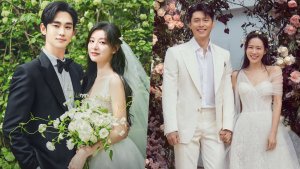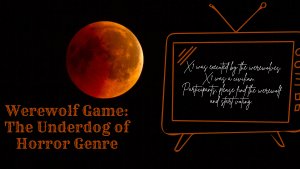 Drama & Film Winners Of The 60th Baeksang Arts Awards
Drama & Film Winners Of The 60th Baeksang Arts Awards
There are spoilers mentioned in this article for the following dramas: Good Bye, My Princess, Empress Ki, and Moon Lovers: Scarlet Heart Ryeo.
A How-To Guide: How to enjoy historical & period dramas!
Did you know that it wasn’t until 1875 that people realized how women get pregnant? According to Edward Dolnick, from AtlasObscura.com: "Ordinary people didn’t know, and neither did the scientists who helped shape the modern world. Leonardo da Vinci didn’t know. Galileo didn’t know. Isaac Newton didn’t know". This was only 146 years ago (approx. 5 generations ago for those over the age of 29). So, if you are older than 29, your great grandparents or great grandparents parents did not know how women conceived. This may be a shocker for most people because we assume that just because we are surrounded by vast knowledge of information that our parents, grandparents, and people who lived during ancient times, also had the same knowledge. When watching dramas, specifically historical and period dramas, how much do we know about the history and period of that time, and is this knowledge necessary to really understand and enjoy the dramas genre?
The image above is studies of the fetus in the womb, by Leonardo da Vinci, c. 1510-13. PUBLIC DOMAIN.
In today’s article, I would like to challenge the way we think when watching historical and period dramas. But first, let's make sure we know what historical and period dramas are. As defined by Google dictionary: “a historical drama is a drama based on historical events. A period drama is a drama based in a particular time or period, not obviously based on real events”. Typically, historical dramas have a heavy focus on politics with little romance, and period dramas tend to have a heavy focus on romance with little politics.
Now that we understand what historical and period dramas are, we will continue to explore how thinking critically when watching historical and period dramas can help us enjoy them as is. It’s human nature to judge what we watch in historical and period dramas based upon our present culture, the present social issues, and current beauty standards. The term for this is "presentism". According to Google dictionary, presentism is defined as an “uncritical adherence to present-day attitudes, especially the tendency to interpret past events in terms of modern values and concepts”. At face value, one can agree that a major con of presentism is it takes away from understanding almost everything behind the actions, and beliefs of ancient and pre-historical rulers, commoners, kingdoms, policies, and even literature.
"The historian, like everyone else, is forever trapped in the egocentric predicament, and presentism is his original sin." - Arthur M. Schlesinger JR
Allow me to give you a practical example. Have you ever wondered why women in prehistoric times married young (as young as 12) and gave birth young (as young as 14)? Note: modern-day historical and period drama writers and directors often portray women getting married and giving birth at around 17-21, even if the drama took place before the 7th century. The portrayal of an older wife and older mother is added to make it more palpable for modern viewers because in our generation the average marriage and birth age in developed countries is between the ages of 24-28. The life expectancy of human life before the 17th century was much shorter: “17th-century English life expectancy was only about 35 years, largely because infant and child mortality remained high. Life expectancy was under 25 years in the early Colony of Virginia, and in the seventeenth-century New England, about 40 per cent died before reaching adulthood. During the Industrial Revolution, the life expectancy of children increased dramatically. The under-5 mortality rate in London decreased from 74.5% in 1730–1749 to 31.8% in 1810–1829", stated in an article on Wiki about life expectancy. Nowadays, due to technology and the field of medicine, many people are living healthy lives well into their 90’s.
As a Christian & biblical scholar, I am comfortable and knowledgeable enough to write that even Mary, the mother of Christ, Jesus, was a teenage wife and mother in the first century (approx. 0-3 AD), but this was something very common during that time and in that culture. Actually, having a baby over the age of 21 was uncommon, and women were not pleased with themselves if they did not marry nor conceive during their teenage years.
It's safe to say that the answer to the question, why women and men married young during ancient times, has to do with the fact that they also died young! Thus, people worked, married, and procreated at a much younger age because those were their prime years. When we think about lifespan in modern times, we should understand that our 20's, could be compared with the pre-teen years for people who lived before the 19th century. Likewise, in modern times our 30’s and 40’s could be compared with the end of life for most people who lived before the 19th century. If you did not know this information, and you watched a historical period drama in which two preteens were getting married, could it have negatively impacted your viewpoint of the drama?
The source to the image used above can be found by clicking on the word source.
There are still a lot of cultural views in modern times that stem from the bias of presentism. This often impacts how people enjoy and understand historical and period dramas. Thus, if we choose not to understand that we are watching dramas dated during prehistoric or ancient times, with different cultures and values from modern times, then we will probably dislike historical and period dramas because we don't understand the actions and motivation behind the characters in the drama, or the reasons why the screenwriter did not allow for a 'happy ending' or what most people would consider a happy ending.
Take, for example, Good Bye My Princess, a great Chinese historical drama which "revolves around the 9th Princess of Western Liang as she journeys to the Central Plains to fulfill a marriage alliance with the Crown Prince". While I really enjoyed the drama, I had a hate-hate relationship with the male lead character as he is the definition of a toxic character. However, being that he was a son of the emperor, and eventually the emperor, his obnoxious behavior is realistic; he wanted to have the ultimate power over his country, over his family, and he was willing to hurt anyone to get it. Most kings during ancient times were not as loving or attractive as we see them being portrayed in dramas. These subtle, but unrealistic additions that are written in dramas are to make the dramas more palpable for modern-day viewers, who overall tend to value freedom and equality among social status, race, and gender. So, when there’s a character with toxic traits in historical and period dramas, we should note that their behavior, while not acceptable in modern times, was acceptable and very common during ancient times and prehistoric times. In 200 years from now, perhaps our behavior will be considered obnoxious or cruel to future generations.
I am currently watching a very good Korean historical drama by the name of Empress Ki, and in episode 35, Han's first empress name is mentioned. I decided to do some research on Lu Zhi, and I found out that “the trauma that she acquired from her marriage with the emperor led her to hunger for political power. Eventually, Empress Lu Zhi became so power-hungry that even her own son did not want to have anything to do with her cruelty. He mysteriously died seven years after rejecting her cruel actions" (source).
The source to the image above can be found by clicking on the word source.
I recently created a voting list on MyDramaList titled “30 top dramas with horrible endings”, and it allowed people to vote for dramas that they believed had horrible endings. There was one condition given to voters, and it was for voters not to add dramas to the list just because at the end of the drama the female and male lead characters did not end up together. As stated in the description area of that voting list, “I think for most dramas a horrible ending would be for the female and male leads to end up together, after what transpired throughout the drama". A couple of people responded by expressing their like for how the drama Moon Lovers ended.
Click on the word source, to view the voting list.
To those replies, I responded by writing: “I agree! If it did not end the way that it did, the female lead would have ended up as a royal concubine (not the queen) and then would have spent her days eventually in a fight within the royal harem. Basically, like the father of the emperor treated the woman he loved at the beginning of his reign, his son would have done the same thing, and thus their child would have suffered too, just like the current emperor did when he was young. Being in the royal harem, whether as queen or concubine, was dangerous and often led to being murdered or their children being murdered."
Sometimes people get so stuck in escapism when watching historical and period dramas that they don't enjoy practicality and realism, which is the whole point of watching nonfiction and fictional dramas about ancient and prehistoric events. Unlike romantic comedies, historical and period dramas are not necessarily written to make us feel hopeful about our love life or even the good in the world, but rather the opposite. It is intended to tell and show us the history of humans, kingdoms, politics, and overall human nature, which often involves cruelty, sadness, betrayal, and sometimes victories but only after years of disappointment.
By the way, the ending of Moon Lovers is historically accurate, as the king in real life really did marry within his family. He was against marrying outside of his family as he thought it caused corruption within the king's court, because the ministers would marry their daughter off to the princes and emperor, in order to gain political power and wealth within the monarchy.
To conclude, in order to enjoy well written and produced historical & period dramas and to avoid giving masterpieces low ratings, it requires a mind that would avoid the bias of presentism. Even with the knowledge that I have, I sometimes still have to take a couple of minutes to get rid of my presentism bias when watching historical and period dramas. As I mentioned earlier, I am currently watching the Korean drama Empress Ki, and I chuckled in awe when the female lead was shocked that she was pregnant. I thought to myself, did she not know that there would be a high probability of getting pregnant? The answer is, probably not. So, instead of thinking this was an error in the script, I realized that, actually, it's consistent with the knowledge of the information the characters would have had during that specific era.
Thank you for taking the time to read this article. My username is TalkingWithYou, and this was the first article that I wrote on MyDramaList. The reason why I chose this specific topic is because I love history. Additionally, I enjoy speaking about social justice issues, and I have a passion for teaching others how to think critically. I hope that you've enjoyed reading the article. In the comment area, please share your thoughts about the bias of presentism and if or how it has impacted the way you understand and enjoy historical and period dramas. What is your favorite historical/period drama, and are there any ancient socio-cultural views that you find it hard to relate to?








